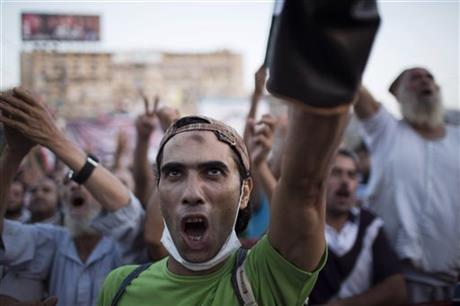
By MAGGIE MICHAEL
A supporter of Egypt’s ousted President Mohammed Morsi chants slogans against Egyptian Army during a protest at the sit-in at Rabaa Al-Adawiya mosque, which is fortified with multiple walls of bricks, tires, metal barricades and sandbags, where protesters have installed their camp in Nasser City, Cairo, Egypt, Monday, Aug. 12, 2013. Security officials said police would besiege the entrenched protest camps within 24 hours — perhaps as early as Monday morning. (AP Photo/Manu Brabo)
CAIRO (AP) — Egyptian authorities on Monday postponed a move to disperse two Cairo sit-ins by supporters of the country’s ousted president to “avoid bloodshed,” an official said, as Islamist supporters stepped up rallies to demand his return to power.
The postponement could, at least temporarily, defuse tensions that had escalated overnight as the country braced for a new bout of violence. Any moves by the police against the protesters would have set the stage for deadly clashes with tens of thousands gathered at the two Cairo sit-ins in support of ex-President Mohammed Morsi, ousted in a popularly supported coup on July 3.
An Egyptian security official, speaking on condition of anonymity because he was not authorized to talk to reporters, said the decision to postpone an advance against the protest camps by Muslim Brotherhood supporters came after a plan on ending the sit-ins was leaked to the media.
The security forces had planned to form cordons around the Cairo protest sites as early as dawn Monday, according to officials who spoke earlier to The Associated Press.
The protesters have said they will not leave until Morsi is reinstated.
Weeks of efforts by the international community to end the standoff and find a peaceful resolution have so far failed. Egypt’s interim prime minister warned just ahead of the Muslim Eid al-Fitr holiday that ended Sunday that the government’s decision to clear the sit-ins was “irreversible.”
Morsi was deposed after millions of Egyptians took to the streets on June 30 and for four days demanded that he step down over what they saw as his failure to act as the president of all Egyptians and his attempts to monopolize power and serve only his Muslim Brotherhood group’s interests.
Morsi has not been seen since the military deposed him, disbanded his Islamists-dominated parliament and suspended the constitution. He is held incommunicado, along with some of his aides, while several top Brotherhood leaders and their Islamist allies are detained on charges of instigating deadly violence.
Other Brotherhood figures, including the group’s top spiritual guide Mohammed Badie, are on the run or taking refuge amid tens of thousands of supporters at the sit-in in Cairo’s eastern Nasr City district, where a road intersection facing Rabaah el-Adawiya mosque has been turned to a heavily fortified tent city.
The sit-in, along with a second one in Cairo’s twin city of Giza, are used as hotbeds for street rallies. The government says the protest camps are a “threat to national security.”
On Monday, Brotherhood supporters also took to the streets in downtown Cairo and elsewhere in the country, chanting anti-military slogans and carrying pictures of Morsi.
Meanwhile, an influential Brotherhood member, Mohammed el-Beltagi, on Monday turned down an offer by the head of the Al-Azhar, the Sunni Muslim world’s top religious institution, to negotiate a solution.
El-Beltagi said that top Al-Azhar cleric Ahmed el-Tayyb was not an impartial mediator because he backed the coup.
Another Brotherhood figure, Saad Emara, dismissed all efforts to negotiate a solution, saying the Brotherhood doesn’t recognize the “initiatives from the post-coup era.”
“The key to a resolution is the return of legitimate institutions, including the president,” Emara told the AP.
Earlier, Interior Ministry officials had said they were prepared for clashes that might be set off by the cordons and that ambulances were on hand to treat the wounded. A special force within the riot police trained for crowd dispersal was expected to deal with protesters.



